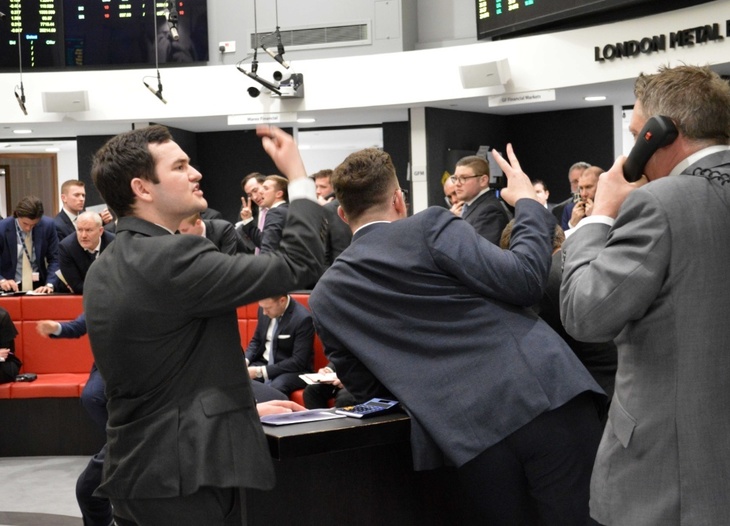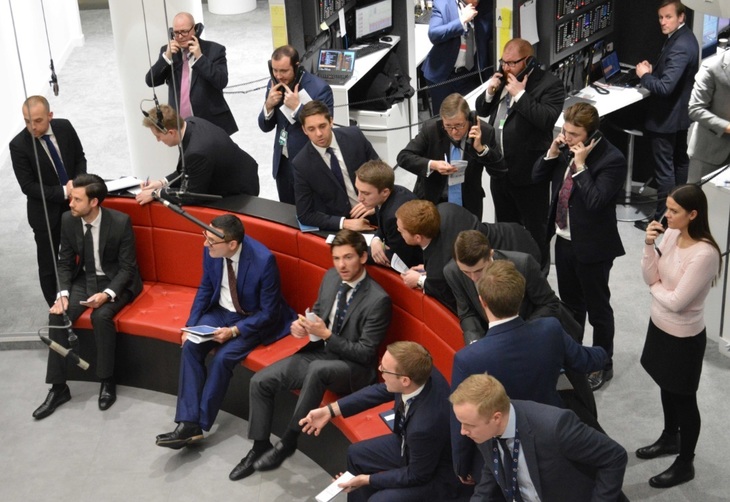
That old rowdy, arm-waving, bid-shouting, braces-pinging image of stock trading — it all went south in the 80s, right?
Well, the braces-pinging bit, maybe. You'll not see many City gents in Gordon Gekko mismatched collars and wide ties anymore. But trading did go electronic at the London Stock Exchange in 1986. In truth, 'open outcry', the old-school auction system where contracts are made via shouted bids and strange hand gestures, only exists in two places in the world today. One is the New York Stock Exchange. The other, in all its deafening splendour, is here in London.
The London Metal Exchange is the world centre for the trading of industrial metals. It provides 24-hour telephone, 18-hour electronic trading — and the extraordinary 'Ring', which sets the prices for all trading.


This used to happen in a coffee house...
Several times a day, for a frantic half-hour or so, a select group of traders physically face each other off to get the best prices for clients around the world. The 12.30pm session sets global official prices; the 4.15pm slot sets closing prices.
Five-minute bursts see the volume rise and fall as traders shout prices, offers and bids, using hand signals, nods and looks to communicate with the team behind them. After four minutes a bell sounds, signalling one minute to go. Right at the end, the noise reaches crescendo as final bids are put in, followed by another bell and silence — until the next metal is announced.
It's thought trading in metals has been taking place since at least Roman times, though a few Iron Age skeletons might take issue with that. There were certainly metal merchants when the Royal Exchange opened in 1571, but it rapidly became too crowded and the metals-guys moved to the Jerusalem Coffee House in the early 19th century, where the Ring was born. Someone with metal to sell would draw a circle in the sawdust on the floor and cry out "Change" — a cue for everyone to bellow at each other.
Over the years it's moved venue – Lombard Exchange, Whittington Avenue, Plantation House and Leadenhall Street. Inventions such as the telegraph and the Suez Canal all brought changes. Suggest to a Ring trader today at your peril however, that he might like to swap his three landlines and naked glove puppets for a nice computer screen.


One ring to rule them all
The LME moved to 10, Finsbury Square in 2016. Like its previous incarnations, the shiny glass office block has a Ring.
The current version's a red circle in the floor, surrounded by leather benches and a wheel of small back-offices. Each of the nine Category One companies that choose to trade face-to-face may place a trader on the bench in front of his (and it is all men, though female-traders have been known) booth. Behind, a team of clerks act as go-betweens to the account executives gabbling into two, sometimes three old-school, curly-cabled phones.
"Each handset represents a client," says Peter Childs, Head of Trading Operations, unofficially 'Lord of the Ring'. "North America, Europe, even a few post-hours Asian clients, follow every quote, every trade; the account executives are providing commentaries and accepting orders. Whichever team provides the best service gets the business. It's very, very competitive.
No electronic equipment is allowed, save official iPads wielded by LME staff recording sales and checking for irregularities. A cloud of microphones avoids disputes, essential when deals are still recorded in little red paper order books. Only about 2% of metal is ever physically delivered. Most is constantly bought and sold but never leaves the LME-approved warehouse. LME is, however, a 'market of last resort' – if all else fails you can physically pick up your assets.


No chewing gum allowed
"Account executives are not allowed to leave the confines of their companies' booths," says Childs. "They could listen in on other people's conversations, which would be a breach of confidentiality. It's self-policing. The telephone leads may seem archaic but the phones literally keep them on a lead."
Stepping away from your booth is just one of many etiquette breaches. "We have minor offences," says Childs, "chewing gum, breach of dress code... They may seem relatively insignificant but it's part of the credibility of what we do so we treat them seriously."


London's largest ashtray?
One example becomes clear as the ring builds energy. Traders are officially bound to remain seated, but can get excited and leap up to confront their rivals. As long as they keep one body part in contact with the bench (usually a foot) they'll avoid the fine.
The painted circle in the centre comes from the days when smoking was allowed. Because traders were not allowed to leave their seats, they would flick used butts into a massive central ashtray. If they missed and had to get up to pick it up, they'd leave the bench and incur that fine.
"Etiquette offences can attract fines of up to £1,000 and penalty points, a bit like driving infringements," says Peter Childs. "Dealing offences, however, can go to £200,000 and ultimately suspension. It's a serious business. The value of copper at the moment is around $7,000 a tonne. You're talking millions of dollars for every single trade."

When Trump literally made prices go through the roof
"We don't keep the ring out of sentiment. It's where base metal reference prices are set, our link to the physical market."
The exchange gets hectic during times of uncertainty. When Trump was elected, on the basis of building a wall, prices literally went through the roof. The Ring became so noisy its besuited gladiators could be heard through the soundproof ceiling.
"It takes a certain sort of person to be able to work in the Ring. The guys at the sharp end, who deal face-to-face, are under intense pressure and there's an immense amount of skill involved. They have to put on a brave face. We have flashpoints but this environment is too small to make enemies. You have to get on with each other. After hours it's all letting off steam."


Play-fighting and hugs
The final bell is the cue for an almost palpable sigh of relief. Play-fighting, joshing and OTT hugs from men who just minutes ago were displaying all the testosterone charms of rutting rhinos.
"It's highly regulated theatre," admits Peter Childs. "It looks pandemonium but the rules the traders have to stick to are very, very strict. I could never be one."



